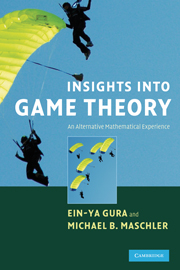3 - The Shapley Value in Cooperative Games
Published online by Cambridge University Press: 04 June 2010
Summary
INTRODUCTION
Game theory has aroused interest both for its mathematical character and for its many applications to the social sciences. Game theory arises from social phenomena as opposed to physical phenomena. People act, sometimes against each other, sometimes for each other; their interests lead them to conflict or cooperation. By contrast, atoms, molecules, and stars crystallize, collide, and explode, but they do not fight or cooperate. Thus, a mathematical theory was created whose system of concepts is drawn from the social sciences.
The word “game” has different meanings for the layman and the game theorist, but the different meanings have a common denominator: the game has players and the players must interact or make decisions. As a result of the players' actions, and perhaps also by chance, the game will yield a certain outcome that is either a punishment or a reward for each one of the players. The word “player” has an unconventional meaning in that it does not necessarily signify an individual. A player can be a team, a corporation, or a state. It is convenient to refer to a group of persons having a common identifying interest and capable of making joint decisions as a single player. One might say that a game is a situation involving several decision-making bodies. Each decision-making body is a player.
Human interactions involve many aspects, such as the capabilities of the players, their desires, their values, the role of the environment in which they function, and so on.
Information
- Type
- Chapter
- Information
- Insights into Game TheoryAn Alternative Mathematical Experience, pp. 97 - 165Publisher: Cambridge University PressPrint publication year: 2008
